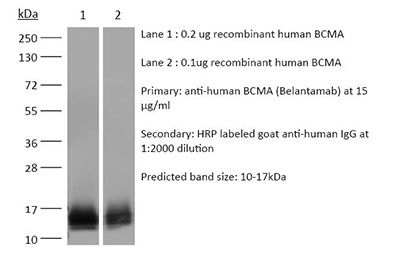Catalog #SIM0056
InVivoSIM anti-human BCMA (Belantamab Biosimilar)
Clone
Belantamab
Reactivities
Human, Monkey
Isotype
Human IgG1, κ
Product Description
This non-therapeutic biosimilar antibody uses the same variable regions as the therapeutic antibody, Belantamab, making it ideal for research use. Belantamab is a humanized IgG1 monoclonal antibody that reacts with B-cell maturation antigen (BCMA), also known as CD269 or tumor necrosis factor receptor superfamily member 17 (TNFRSF17). BCMA is a single-pass type III membrane glycoprotein, and it is selectively expressed by mature or differentiated plasma B-cells in normal lymphoid tissues (e.g., bone marrow, spleen, lymph nodes, and tonsils). BCMA is not expressed on naive B cells, T cells, monocytes/macrophages, neutrophils, and other normal tissues. BCMA is expressed uniformly and in high abundance in multiple myeloma tissues, and its low-to-moderate levels of expression are reported in several other hematologic malignancies also (e.g., chronic lymphocytic leukemia, acute B-lymphoblastic leukemia, and non-Hodgkin/Hodgkin lymphomas). BCMA acts as a receptor for two distinct agonist ligands: B cell-activating factor [BAFF (also known as TNFSF13B or BLyS)] and a proliferation-inducing ligand (APRIL, also called TNFSF13). In comparison to BAFF/Blys, BCMA binds APRIL/TNFSF13 with higher affinity. BCMA plays a critical role in promoting B-cell survival and the regulation of humoral immunity. BCMA is also involved in the activation of NF-kappa-B and JNK-3 signaling pathways. In multiple myeloma, BCMA expression is directly related to the growth/proliferation of cancer cells, and serum levels of soluble BCMA (sBCMA) are suggested as a potential biomarker in multiple myeloma. In several experimental studies, an antibody-drug conjugate (ADC) consisting of belantamab conjugated to mafodotin has been shown to induce antibody-dependent cellular cytotoxicity (ADCC) and apoptosis in cancer cells.
Specifications
| Isotype | Human IgG1, κ |
|---|---|
| Recommended Isotype Control(s) | RecombiMAb human IgG1 isotype control, anti-hen egg lysozyme |
| Recommended Dilution Buffer | InVivoPure pH 7.0 Dilution Buffer |
| Mutations | E356D/M358L |
| Immunogen | Human BCMA (CD269) |
| Reported Applications |
in vivo functional assays in vitro functional assays Flow cytometry Immunoprecipitation Western blot ELISA |
| Formulation |
PBS, pH 7.0 Contains no stabilizers or preservatives |
| Endotoxin |
≤0.5EU/mg (≤0.0005EU/μg) Determined by LAL assay |
| Purity |
≥95% Determined by SDS-PAGE |
| Sterility | 0.2 µm filtration |
| Production | Purified from cell culture supernatant in an animal-free facility |
| Purification | Protein A |
| Molecular Weight | 150 kDa |
| Murine Pathogen Tests |
Ectromelia/Mousepox Virus: Negative Hantavirus: Negative K Virus: Negative Lactate Dehydrogenase-Elevating Virus: Negative Lymphocytic Choriomeningitis virus: Negative Mouse Adenovirus: Negative Mouse Cytomegalovirus: Negative Mouse Hepatitis Virus: Negative Mouse Minute Virus: Negative Mouse Norovirus: Negative Mouse Parvovirus: Negative Mouse Rotavirus: Negative Mycoplasma Pulmonis: Negative Pneumonia Virus of Mice: Negative Polyoma Virus: Negative Reovirus Screen: Negative Sendai Virus: Negative Theiler’s Murine Encephalomyelitis: Negative |
| Storage | The antibody solution should be stored at the stock concentration at 4°C. Do not freeze. |
| Need a Custom Formulation? | See All Antibody Customization Options |

